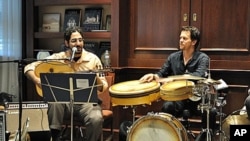Famed guitarist Jimi Hendrix once said “Music doesn't lie. If there is something to be changed in this world, then it can only happen through music.” And some say that music also played a role in this year’s so-called Arab Spring.
A group of educators and musicians gathered recently at the Georgetown Center for Contemporary Arab Studies in Washington, D.C., for a seminar showing how music can help promote understanding between people of differing political views. The gathering, which focused on music in the Middle East, featured the Chicago-based group Lamajamal.
Lamajamal
Lamajamal - a contemporary group that performs Balkan, Arabic, North African and Gypsy music and whose name is a palindrome of the Arabic word for peace – features Palestinian-American Ronnie Malley on oud, guitar, accordion and vocals. Percussionist George Lawlor plays a modified trap set made up of hand drums, and was a student of Tunisian master Najib Bahri. Gary Kalar plays guitar, cümbüş - a Turkish mandolin - and percussion. Bassist Joey Spilberg and wind instrument specialist Eve Monzingo are the remaining members.
Watch our mobile phone Quicktake of Lamajamal performing:
Music as a bridge
During the seminar, Malley explained that music has always been part of revolutions in the Middle East. He says famed Egyptian singer Umm Kulthum, composer Mohamed Abdel-Waheb and Fairuz of Lebanon used music to promote political change in their times.
“People use it as a tool of expression to state that they are upset,” he said.
“But it can also easily be used as a bridge, because it has in the past, to bring people together. Particularly in the case of Umm Kulthum when she went to establish better relations between Tunisia and Egypt at a time of a – she needed to create some reconciliation basically,” Malley said.
“And because of the power of her music and the influence she had over the entire Middle East,” he said, “people just had to listen, they had to hear her out.”
|
Listen to David Byrd’s interview with Lamajamal’s Ronnie Malley:
|
Musical activism was also prevalent in this year’s Arab Spring, where singers like Mohamed Mounir and Ramy Essam played pivotal roles in giving voice to the protests.
Essam, who put the chants of Egyptians in Tahrir square to music, paid a price for his art. He was arrested and beaten within hours of performing. But he continued to sing.
Different cultures, same passion
During the Georgetown seminar, Malley and Lamajamal use three types of music – Arabic and North African, Klezmer music and Turkish music – to illustrate the similarities of the differing traditions. Ronnie Malley says music offers people who are politically at odds the opportunity to find something that brings them together.
“Because it’s not quite often that if I am holding the arm of an instrument as an arm, basically, it’s not often that I am going to be at odds with the person across from them because we are going to try to find a way to play music together,” he said.
“If I was holding a gun, the only way to operate that gun is to shoot the other person. If I am holding an instrument, I strum a chord and I expect a reaction in the same way back from that. It’s the world of music. That’s how it goes, music is the universal language.”
|
Listen to “Sidi Habibi” by Lamajamal:
|
Guitarist Gary Kalar led the discussion on Turkish music. He said his music has opened many doors, and he has found many receptive audiences regardless of where the band is touring.
“I have never run into anybody from another culture who found anything I played insulting,” he said.
“And they have never shown any sort of reaction that made me feel like ‘that was the wrong thing to do,’ or something like that which sometimes you worry about especially with civil wars or ethnic wars, things like that. It can get really personal really fast,” Kalar said.
Unifying power
Malley and Kalar agree that music has the power to unify people, to bring about change, and to transform thinking. But traditions are also jealously guarded. Kalar told VOA that when he runs into someone who says he can’t play their music because he is an American, he respects their passion even if he disagrees with their premise.
“So whenever I run into this type of attitude I usually just respectfully say “yeah, you’re right” or something like that. And that’s it. I don’t try to … I don’t try to change their mind.”
Arts - a necessity
With cuts slated for several federal arts programs in the United States – including the National Endowments for the Arts and Humanities – school systems and arts organizations have to reorganize their priorities.
Zeina Azzam Seikaly is the Coordinator of Educational Outreach at Georgetown’s Center for Contemporary Arab Studies. She says that cutting arts programs is ill advised because the arts offer an avenue of communication that other methods do not.
“And it’s I think also really important to show how arts interact with culture and arts are a window to understand other cultures,” she said.
“It’s nice to have this multidisciplinary perspective where we are combining the arts and social studies and history and language. And I think the arts are just such an important and integral aspect of the whole education of an individual,” she added.
Seikaly said responses to the seminar have been overwhelmingly positive. She says the Middle East is often looked at as a region of conflict, but bringing in music, culture, and the arts help give people a more comprehensive look at the region and the rich, diverse history and culture it holds. She stressed the musical interaction of the area helps illustrate that civilizations are not closed, discrete things, but that there is often a blending of cultures that can lead to better understanding.




